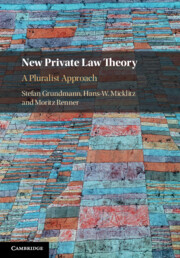Book contents
- New Private Law Theory
- New Private Law Theory
- Copyright page
- Contents
- Preface
- New Private Law Theory
- Part I Methods and Disciplines
- Part II Social Ordering, Constitutionalism and Private Law
- Part III Transactions and Risk: Private Law and the Market
- Part IV Persons and Organizations
- Part V Private Law (Rule-Setting) beyond the State
- 23 Law as a Product
- 24 Multilevel Governance and Economic Constitution
- 25 Transnational Law
- 26 Private Ordering
- 27 The Shadow of the Law and Social Embeddedness
- Index
- References
24 - Multilevel Governance and Economic Constitution
from Part V - Private Law (Rule-Setting) beyond the State
Published online by Cambridge University Press: 09 April 2021
- New Private Law Theory
- New Private Law Theory
- Copyright page
- Contents
- Preface
- New Private Law Theory
- Part I Methods and Disciplines
- Part II Social Ordering, Constitutionalism and Private Law
- Part III Transactions and Risk: Private Law and the Market
- Part IV Persons and Organizations
- Part V Private Law (Rule-Setting) beyond the State
- 23 Law as a Product
- 24 Multilevel Governance and Economic Constitution
- 25 Transnational Law
- 26 Private Ordering
- 27 The Shadow of the Law and Social Embeddedness
- Index
- References
Summary
This chapter concerns the significance of the ordo-liberal economic constitution for the construction of the European Economic Community, the European Community and, today, of the European Union. In this context, the concept of multilevel governance and the economic constitution are interlocked. The founders of ordo-liberalism conceived of the ordo-liberal model in the context of a national economy – this constitutes the prime theme of Chapter 6 as far as it discusses Franz Böhm’s concept of a private law society – and not for a multinational community of states or for any kind of a transnational economic order.
- Type
- Chapter
- Information
- New Private Law TheoryA Pluralist Approach, pp. 454 - 471Publisher: Cambridge University PressPrint publication year: 2021

